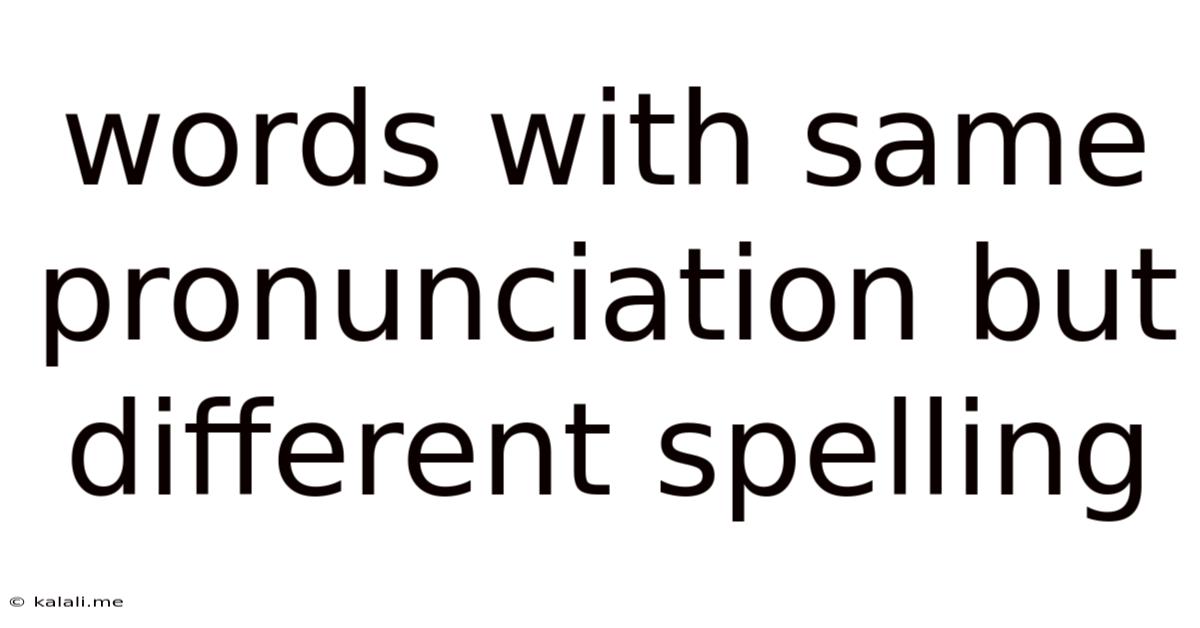Words With Same Pronunciation But Different Spelling
Kalali
Jun 10, 2025 · 3 min read

Table of Contents
Decoding Homophones: Words That Sound the Same, But Mean Different Things
Meta Description: Explore the fascinating world of homophones – words that share the same pronunciation but have different spellings and meanings. This guide delves into examples, explanations, and tips to avoid common mistakes. Learn how to master these tricky words and improve your writing!
Homophones are words that sound alike but have different spellings and meanings. They can be a source of confusion for both native and non-native English speakers, leading to spelling and grammatical errors. Understanding homophones is crucial for clear and effective communication, whether you're writing a formal essay, a casual email, or a compelling blog post. This article will delve into the intricacies of homophones, providing examples and strategies to confidently navigate this linguistic landscape.
Common Categories of Homophones
Homophones fall into several categories, each presenting its own unique challenges. Let's explore some of the most common types:
-
Simple Homophones: These are the most straightforward, involving relatively common words. For example:
- Their/There/They're: "Their car is parked over there," "They're going to the store."
- To/Too/Two: "I'm going to the park," "It's too hot outside," "I have two dogs."
- Hear/Here: "I can hear you," "Come here."
- See/Sea: "I can see the boat," "The vast sea stretched before us."
- Your/You're: "Is that your book?" "You're doing a great job!"
-
More Complex Homophones: These involve less frequently used words or those with subtle differences in meaning. Examples include:
- Accept/Except: "I accept your apology," "Everyone except John attended the meeting."
- Affect/Effect: Generally, "affect" is a verb (to influence), while "effect" is a noun (result). However, "effect" can also be a verb meaning "to bring about."
- Principle/Principal: "The principle of fairness," "The school principal announced the news."
- Stationary/Stationery: "The car remained stationary," "I bought some new stationery."
Mastering Homophones: Tips and Tricks
Successfully differentiating between homophones requires consistent effort and practice. Here are some helpful strategies:
- Context is Key: Pay close attention to the sentence's overall meaning. The context often provides clues to the correct word.
- Root Words and Etymology: Examining the origins of words can shed light on their meanings and help distinguish between similar-sounding words.
- Use a Dictionary or Thesaurus: Don't hesitate to consult these resources when you're unsure about the correct spelling or meaning.
- Practice Makes Perfect: Regularly reading and writing will enhance your understanding and ability to correctly use homophones.
- Mnemonic Devices: Create memorable phrases or rhymes to help recall the difference between specific homophone pairs. For example, to remember "there" (place), visualize a "th" pointing to a location.
The Importance of Accurate Word Choice
Using the correct homophone is crucial for maintaining clarity and credibility in your writing. Misusing these words can lead to misunderstandings and detract from the overall impact of your message. Mastering homophones showcases your attention to detail and demonstrates a strong command of the English language. Take the time to learn these tricky words, and you’ll significantly improve your writing skills and communication effectiveness.
This comprehensive guide provides a solid foundation for understanding and utilizing homophones correctly. By employing these strategies and dedicating time to practice, you can confidently overcome the challenges these words present and elevate your writing to a higher level. Remember to always double-check your work and utilize resources when in doubt.
Latest Posts
Latest Posts
-
How Much Is Half A Billion Dollars
Jul 01, 2025
-
How Many Days Are In 9 Years
Jul 01, 2025
-
How Much Is 1 8 And 1 8 Teaspoon
Jul 01, 2025
-
How Many Feet In A Quarter Acre
Jul 01, 2025
-
How Many Feet Is Half An Acre
Jul 01, 2025
Related Post
Thank you for visiting our website which covers about Words With Same Pronunciation But Different Spelling . We hope the information provided has been useful to you. Feel free to contact us if you have any questions or need further assistance. See you next time and don't miss to bookmark.